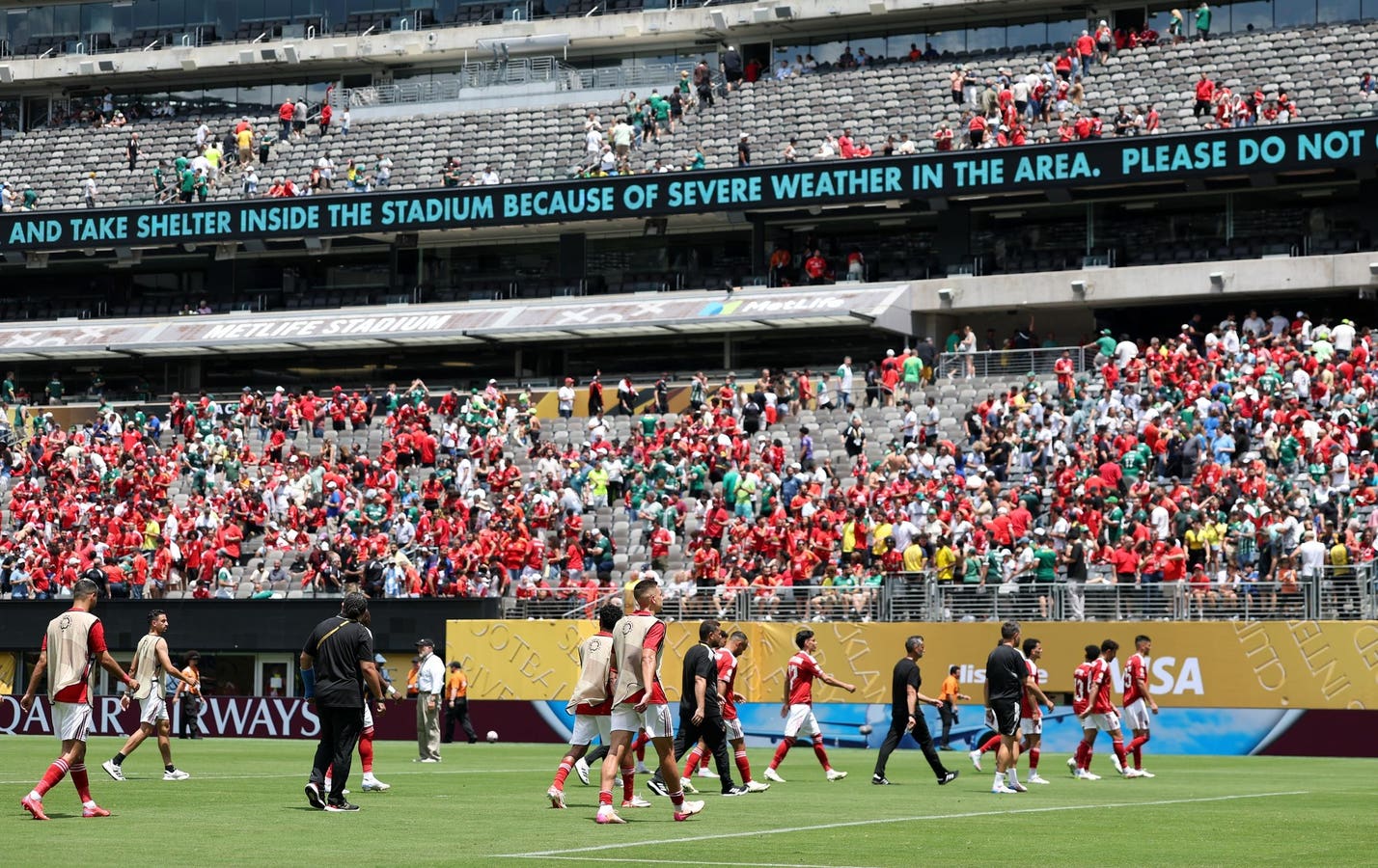EAST RUTHERFORD, NEW JERSEY – JUNE 19: A general view as players leave the pitch due to a severe … More
When FIFA Club World Cup kicked off across the U.S. this June, extreme heat concerns were top of mind. These concerns turned out to be well-founded, but it has been unpredictable skies, thunder, lightning and torrential rain that have led to six matches so far experiencing long delays ranging from 46 minutes to nearly two hours.
These frequent stoppages are a highly-visible sign of how climate change-driven weather extremes are reshaping the landscape of global sport, could have economic ramifications for the tournament and raised concerns about preparations for next year’s FIFA Men’s World Cup in the U.S.
CHARLOTTE, NORTH CAROLINA – JUNE 28: The giant screen informs on weather delay during the FIFA Club … More
Club World Cup Matches Impacted By Delays
The first match of the tournament to be impacted by extreme weather was Ulsan HD and Mamelodi Sundowns, whose June 17 match in Orlando, Florida, was delayed for more than an hour due to the threat of lightning. On the same day in Nashville, Tennesse, Boca Juniors and Auckland City had their game paused for around 50 minutes due to FIFA lightning storm protocol being activated.
Next was Pachuca vs. Red Bull Salzburg in Cincinnati, Ohio, on June 18. A one hour and 37 minute delay was caused by heavy rainfall and lightning. Palmeiras and Al Ahly had their match suspended for 46 minutes in East Rutherford, New Jersey on June 19, due to lightning strikes. Temperatures reached 88F, and a cooling break was given to players midway through the first half also.
PASADENA, CALIFORNIA – JUNE 15: Marquinhos of Paris Saint-Germain cools down in the hot weather … More
On June 20, the longest delay of the tournament so far took place in Orlando, between Benfica and Auckland City. Play was suspended for two hours due to a lightning storm in the area. The most recent delay comes as things heat up competitively, as well as physically. Chelsea secured a quarter final spot in Charlotte, North Carolina on June 28 against Benefica, in a game that took 4 hours and 4o minutes to complete, with a one hour and 53 minute delay happening just 5 minutes before full time. This match delay happened during ‘lightning safety awareness week,’ which takes place in the U.S. every June.
What Has This Got To Do With Climate Change?
The U.S. is no stranger to intense thunderstorms and lightning strikes, especially in June, July and August. However, climate change-induced rising global temperatures mean warmer air, which holds more moisture. This increases the chance of thunderstorms, leading to more violent storms, lightning strikes, and downpours that lead to localised flash flooding.
TOPSHOT – A lightning is seen in the sky during the FIFA Club World Cup 2025 Group H football match … More
Florida is broadly considered the “lightning capital” of the country, with more than 2,000 lightning injuries over the past 50 years. Southeastern states, including Texas, Colorado, North Carolina, Alabama, Arizona, Georgia, Missouri, New Jersey, and Pennsylvania are most at risk, according to U.S. Centers For Disease Prevention and Control.
Economic Ramifications Of Extreme Weather
Sport has an increasingly volatile opponent, extreme weather. Player, spectator and staff safety will always be the top priority, however, for major, televised sports tournaments, delays have wide-ranging economic ramifications.
The timing and duration of delays caused by extreme weather can impact spectators staying in-stadia, have broadcasting implications for wider-viewership and scheduling, as well as leading to physical health risks and loss of focus from players and officials.
EAST RUTHERFORD, NEW JERSEY – JUNE 19: Fans return to their seats in the stands after a weather … More
Schedule delays can force broadcasters to redistribute airtime, negotiate compensations, or lose advertising slots. Repeated and consistent game disruption, like we have seen during FIFA Club World Cup, indicates a pattern that could undermine viewer satisfaction, advertiser value and lead to reduced rights fees in the future events due to perceived risk.
This pattern could also lead to economic impacts to entire economies when bidding to host major tournaments. “I think it’s a joke to be honest, it’s not football. I struggle to understand. I can understand that for security reasons, you suspend the game. But if you suspend seven, eight games, that means that probably [this] is not the right place to do this competition,” shared Chelsea FC manager Enzo Maresca.
In-stadia staffing and operational costs will rise, as ushers, security and concessions staff remain on duty for longer. Revenue could also be impacted if fans have to endure prolonged stadium confinement and demand compensation. With some FIFA Club World Cup delays stretching to up to two hours, some fans chose to leave entirely.
Currently it might be that additional time in concessions areas will be a benefit, potentially leading to increased sales of food, drink and merchandise. There is no industry standard currently, but in the future there may feasibly be a duty of care to support the care comfort of fans coupons for hydration or food, as we see when delays are experienced in the aviation sector.
Teams could potentially face added expenses, from extended rentals of hotels, buses, and likely more medical staff coverage. Performance impacts are a consideration too, including physiological and mental impacts for athletes competing in extreme heat or experiencing long breaks during play. After the match in which his team endured cooling breaks and a long delay, Palmeiras manager Abel Ferreira said, “I don’t know if you could read the faces of the players but they felt the weather and the climate and that impacted them.”
CHARLOTTE, NORTH CAROLINA – JUNE 28: Enzo Maresca, Head Coach of Chelsea FC, reacts during the FIFA … More
Enzo Maresca touched on another player impact. Loss of focus. “As a manager, it’s difficult to manage two hours suspended,” he said. “How can you keep them two hours inside, focused?” He went on, “we are happy to be in this competition. But it’s something that is not normal.”
Chief operations officer for the 2026 Men’s World Cup, Heimo Schirgi, will no doubt be watching these goings on intently. Ahead of the tournament he said, “everyone is eager to come back after the Club World Cup and say ‘OK, this is what we learned. This is what we need to change. This is what we can keep.’”
Delays at the FIFA Club World Cup caused by extreme weather have done more than just disrupt games, they have exposed the growing financial risks climate change poses to global sport. From extended broadcast windows and disrupted advertising schedules to rising staffing costs, the potential for fan compensation, and logistical strain on teams, the economic toll is clear and growing. As climate volatility increases, these disruptions will erode sponsor confidence, inflate operational budgets, and could devalue future media rights. The question facing 2026 FIFA Men’s World Cup organisers, and those of all major global sports tournaments, is now how well prepared they are for extreme weather impacts, and how their organisations are helping tackling the cause, not just treating the symptoms. The cost of inaction is no longer theoretical.









